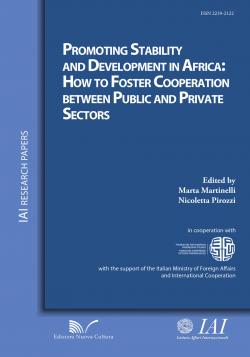Promoting Stability and Development in Africa: How to Foster Cooperation between Public and Private Sectors
L'Africa sta vivendo una delle più profonde trasformazioni della sua storia. L'Africa sub-sahariana è caratterizzata ancora oggi da una continua instabilità e da migrazioni di massa e crisi, ma allo stesso tempo anche da sviluppi positivi tra cui la crescita economica e l'integrazione regionale. Questo volume illustra tali cambiamenti da tre diverse angolazioni: le politiche economiche e lo sviluppo sostenibile; il buon governo e la democrazia; la pace e la sicurezza. Esperti africani ed europei hanno condotto ricerche nelle regioni d'interesse dell'Africa sub-sahariana e in alcuni paesi chiave (Etiopia, Mozambico, Nigeria e Sud Africa) con l'obiettivo di valutare il ruolo del settore privato e determinarne le potenziali opportunità di collaborazione con il settore pubblico. All'Unione europea viene fornita una serie di raccomandazioni politiche su come sviluppare queste opportunità, in collaborazione con vecchi e nuovi attori.
Prodotto nell'ambito del progetto di ricerca "Promoting Stability and Development in Africa: How to Foster Cooperation between Public and Private Sectors" condotta dall'Istituto Affari Internazionali (IAI) e dalla Foundation for European Progressive Studies (FEPS), con il sostegno del Ministero degli Affari esteri e della Cooperazione internazionale. Presentato alla conferenza "Fostering Stability and Development in Sub-Saharan Africa: Analysis and Perspectives on Public-Private Partnerships", Bruxelles, 10 febbraio 2016.
-
Dati bibliografici
Roma, Nuova Cultura, novembre 2015, 207 p. -
Numero
21 -
ISBN/ISSN/DOI:
978-88-6812-595-0
List of Contributors, p. 9
List of Abbreviations, p. 11-16
Preface, by Massimo D’Alema, p. 17-23
Introduction, by Marta Martinelli and Nicoletta Pirozzi, p. 25-27
1. A Case Study of Ethiopia, by Mehari Taddele Maru and Abel Abate Demise, p. 29-66
1.1 Economic Development: Combating Poverty
1.1.1 The Political Economy of Ethiopia: The 1970s Student Movement and its Dominant Political Framework
1.1.2 Developmental Political Party: Towards a UNDP-like State?
1.1.3 Public-Private Partnership in Ethiopia: PPP in a Developmental State
1.1.4 The Ethiopian Public-Private Consultative Forum
1.2 Governance and Democratisation: a Mixed Performance Record
1.2.1 Federal Policy: Addressing National Civil War and Localised Conflicts
1.2.2 Ethiopia According to International Indicators
1.2.3 Elections in Ethiopia: The Democracy Deficit
1.3 Peace and Security: Main Factors for Insecurity and Instability
1.3.1 External Threats
1.3.2 Internal Threats
1.4 Ethiopia’s Regional Diplomatic and Integrative Role: Stability, Peace and Development
1.4.1 Leadership in Multilateral Diplomacy
1.4.2 Bilateral Relations: Ethiopia and Its Neighbours
1.4.3 The Integrative Role of Ethiopia
1.5 Trends: Reform Outpacing Crisis? Or Crisis Outpacing Reform?
1.5.1 The Security Nexus: Climate Change, Water, Food and Energy Security
Conclusions
Recommendations
2. A Case Study of Mozambique, by Paulo Mateus Wache, p. 67-91
2.1 Historical Overview: From Socialism to Capitalism
2.2 Public-Private Sector Relations
2.2.1 Prevalence of Public Sector over Private Sector (1975-1990)
2.2.2 Transition Period (1990-2000)
2.2.3 Consolidation of Private Sector (2000-2014)
2.3 Socio-Economic Development
2.4 Private Sector and Democratic Governance
2.5 Private Sector and Stability
Conclusions
Recommendations
3. A Case Study of Nigeria, by J. Shola Omotola, p. 93-115
3.1 The Private Sector and Socio-Economic Development
3.1.1 National Policy Initiatives/Interventions for Socio-Economic Development
3.1.2 Policy Impact on Private Sector and Socio-Economic Development
3.1.3 Despite Growth, Key Concerns and Challenges Abound
3.2 The Private Sector and Governance and Democracy
3.2.1 Selected CSOs and the Promotion of Governance and Democracy
3.2.2 Despite CSO Mobilisation, Key Concerns about Governance and Democracy Remain
3.3 The Private Sector and Peace and Security
3.3.1 Public and Private Sector Responses to the Challenge of Peace and Security
Conclusions and Recommendations
4. A Case Study of South Africa, by Catherine Grant Makokera, p. 117-145
4.1 Cooperation between the Public and Private Sectors in South Africa
4.1.1 Overview of State-Business Relations in South Africa
4.1.2 South Africa’s Economic Diplomacy
4.2 The Private Sector and Socio-Economic Development
4.2.1 Overview of South African Economic Policy
4.2.2 Key Sectors for Development and Structural Transformation
4.2.3 Regional Economic Development and South Africa
4.3 The Private Sector and Governance and Democracy
4.3.1 Overview of Governance and Democracy Indicators in Southern Africa
4.3.2 Challenges to Combating Corruption
4.4 The Private Sector and Peace and Security
4.4.1 Crime and Security in South Africa
4.4.2 South Africa as a Regional Peacemaker
Recommendations
5. Promoting Stability and Development in Africa: How to Foster Cooperation between Public and Private Sectors, by Giorgio Garbasso, Marta Martinelli and Nicoletta Pirozzi, p. 147-176
5.1 Implementing Economic Policies and Structural Reforms for Sustainable Development: Fostering PPPs in the Energy, Infrastructure and Agricultural Sectors
5.1.1 State-Business Relations in Domestic and Foreign Economic Policies
5.1.2 PPPs in Three Key Sectors: Agriculture, Infrastructure, Energy
5.2 The Role of PPPs in Democracy Promotion and Good Governance in Sub-Saharan Africa
5.2.1 Potential for PPPs to Improve the General Governance Environment
5.2.2 Challenges to PPPs’ Role in Promoting Democracy and Good Governance
5.3 Peace and Security: Engaging Private Actors in the Fight Against Terrorism, Crime and Conflict
5.3.1 Building Capabilities and Providing Resources to the Security Sector: The Role of PPPs
5.3.2 Promoting the Involvement of Non-State Actors in Conflict Prevention, Conflict Resolution and Peacebuilding
Conclusions: A new PPP Agenda for the Joint Africa-EU Strategy?
References, p. 177-207
1. A Case Study of Ethiopia
2. A Case Study of Mozambique
3. A Case Study of Nigeria
4. A Case Study of South Africa
5. Promoting Stability and Development in Africa




